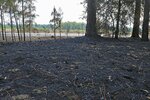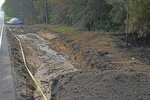


Update: On September 20, Allendale Fire Chief Franklin Stanley contacted The People-Sentinel. This story has been updated with Stanley’s information.
In the weeks since a tanker truck fire occurred on Allendale’s Highway 125, questions remain about what happened and the extent of the damage to public and environmental health.
The crash occurred on Saturday, September 9 around 6:30 pm when the tanker truck was heading south and collided with a truck pulling a camper. The tanker’s fuel caught fire, creating late evening a plume of fire and smoke, as seen in photos of the scene. Firefighters from surrounding towns and counties came to the site of the crash to help extinguish the fire.
In the week following the crash, which occurred on Saturday, September 9, The People-Sentinel called the Allendale County Fire Department three times for more information. Each time, a secretary at the office told The People-Sentinel that only Fire Chief Franklin Stanley could give out information about the fire, and he would be reminded to contact The People-Sentinel. By press time on September 19, Stanley never reached out to The People-Sentinel. However, on the morning of September 20, Stanley contacted The People-Sentinel.
Stanley said the firefighters were at the site until the early morning of September 10, and used fire fighting foam and several thousand gallons of water. Additionally, the cost of the cleanup will be paid for by the company that the trucker worked for.
“[The Department of Health and Environmental Control] will come out and do their assessment and they will give the trucking company instructions on what they gotta clean up,” Stanley said.
The People-Sentinel also contacted the South Carolina Department of Health and Environmental Control, which is responsible for assessing environmental damage but did not receive a response. The People-Sentinel reached out to the South Carolina Highway Patrol, but received no information.
The average tanker truck carries 10,000 gallons of fuel, although how full the truck was remains unknown. Additionally, the amount of fuel within the truck that was burned off or leaked into the ground is also unknown. Knowing these factors helps determine the public health and environmental effects that the disaster caused, according to Michel Boufadel, professor of civil and environmental engineering at the New Jersey Institute of Technology. Boufadel’s work focuses on oil and fuel spills.
“The most rapid impact is going to be air quality,” Boufadel said. “The toxic fumes or gasses migrating could affect neighboring areas. The scale of it is always an issue; if you have one gallon of the same material spill, it is going to be less than thousands of gallons or more.”
Boufadel said the fact that the crash occurred in such a remote area of the county bodes well for the public health effects of the fire and those who don’t live in the immediate vicinity of the fire shouldn’t be concerned.
The fire burned several meters into the nearby woods, leaving behind charred earth, trees and plants. Additionally, the soil near the site has been excavated and covered with a tarp. How much fuel spilled onto the ground and how deeply it permeated the soil are also unknown, but are needed to understand the long-term effects, according to Boufadel.
“Locally, [the effects of the fire] are going to be bad,” Boufadel said. “Any local plants are going to die, but it depends on the scale. If the roots of a tree are deep, they will manage. For these things, the concern is the groundwater. Gasoline can migrate downward and get into the groundwater. There’s a good chance that happened here.”